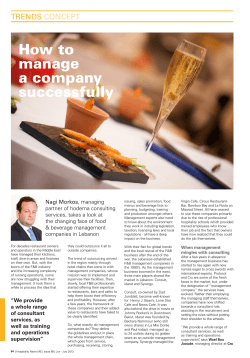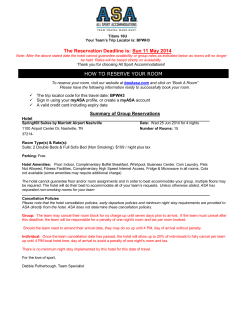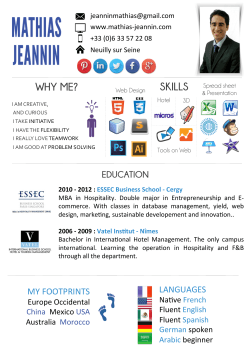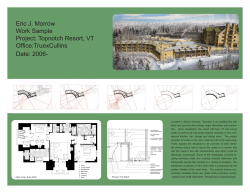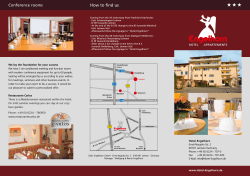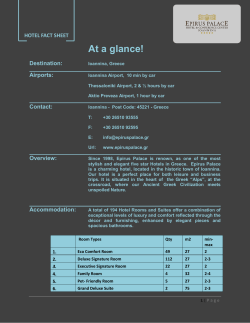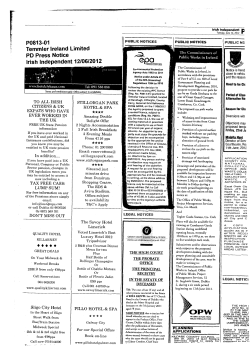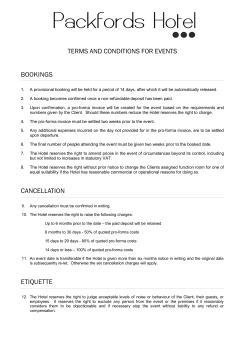
Document 347188
International Journal of Human Resource Management and Research Vol.1, Issue.1 (2011) 44-56 © TJPRC Pvt. Ltd., HR CONCEPTS IN HOTEL INDUSTRY TOWARDS EMPLOYEE TRAINING AND DEVELOPMENT 1 S.M. Denis Amirtharaj, M.B.A., M.Phil., Ph.D (P) 2S. Kalist raja cross, M.B.A., M.Phil., Ph.D (P) 3Dr. Vanathi vembar, 1 Asst. Professors, department of hotel & catering management, Sathyabama university, Chennai – 600119. [contact no: 9841007897] 2Research guide: Associate professor Cum Liaison Officer, Dde, Annamalai University Information Center, Vadapalani, Chennai. ABSTRACT Hotel Industry is one of the fastest growing sectors of the economy of our Country. The hotel industry is varied enough for people to work in different areas of interest and still be employed within the hotel industry. This trend is not only in India, but also in world wide. The human resource department plays a major role in Hotel Industry in helping plan the system and in developing job description, job specification and performance standards. The human resource department is not involved in the actual writing of performance standards but play a diagnostic, training and monitoring role. Training and development activities are designed by the Human Resource department in order to impart specific skills, abilities and knowledge to employees. Effective training is basic ingredient of success in the hotel industry. One of the main problems in hotel industry is that investment in training and development of employees is a reactive process for many companies. Frequently, training and development arises as the result of significant change in the operational environment or as a consequent of crisis such as staff turnover or major departmental problems. Training is then used to cope with the immediate difficulty. Here the Human Resource responsibility is to identify the training need and then accordingly to design the suitable programme for the same. Training within a hotel provides the best opportunity to influence the attitude and 44 Hr Concepts In Hotel Industry Towards Employee Training And Development performance of employees. The training programmes include is such as introduction, fire, food hygiene, control of substances hazardous to health, manual handling first-aid, technical skills, product knowledge, and the prime importance of customer service. 1. HRM IS VITALLY IMPORTANT IN HOSPITALITY INDUSTRY Especially it applies to Hotel and tourism and businesses. Basically HRM is a series of integrated decisions that form the employment relationship. Whether these decisions are efficient and consistent with one another directly influences ability of the company and its employees to achieve objectives. The entire HR mix includes the following activities: staffing, training and development, compensation, employee relations, and work structure. Each of these five in turn comprises several sub-concepts. Managing personnel of hospitality related business is somewhat different from that of another business. First of all, this kind of businesses is purely customer motivated. Hospitality businesses provide series of services and so employees should take into account individual preferences of each customer. Unlike at barber’s shop, for example, where most customers are local dwellers, hospitality businesses deal primarily with tourists, people from distant lands, people with different language, culture, religion, and other beliefs. There are many ways to boost personnel dedication and overall performance in hospitality businesses. Some of these ways intersect with general HRM concepts, while the rest is applicable to only tourism and hospitality companies. Every qualified HR specialist would want to keep current employees in lieu of constantly hiring new ones. So holding on to good, experienced, longterm employees saves time, money and effort, however this method requires a knotty strategy that goes far beyond the pay. In the hotel industry, for example, it is not an unusual case that the entire staff changes perpetually. So HR managers would want to implement new series of ideas to boost personnel internal motivation. 45 S.M. Denis amirtharaj , S. Kalist raja cross, Dr. Vanathi vembar One way to keep current experienced employees happy is to permit flexible work schedule; not only arrange three of four shifts. This arrangement will allow employees to choose the best time that fits them. Another very useful technique HR manager might want to consider is to communicate much. So HR specialist must provide this information via different mediums like newsletters, memos, staff presentations, regular meetings, and Internet. Utilizing these channels both up and down, HR managers should keep employees up to speed with the company’s strategies, achievements, directions. This way people would feel they are not separate, but rather inseparable links of a greater entity, and this felling of unity in turn will entail greater internal motivation. Grievance boxes or other mediums that can highlight grievances are also very important. Employees should without fear list grievances, other they might simply leave the company without managers even knowing why. This way resolving current employees’ complaints will reduce future resignations. 2. ROLE OF HUMAN RESOURCE DEPARTMENT IN HOSPITALITY INDUSTRY The human resource department plays a major role in helping plan the system and in developing job description, job specification and performance standards. Specialists in that department may be assigned to conduct job analysis and write job descriptions in cooperation with managers, supervisors and employees. The human resource department is not involved in the actual writing of performance standards but play a diagnostic, training and monitoring role. The human resources department’s role in job design is usually indirect, although job design influences almost every aspect of human resources management. The department diagnoses organizational problems that suggest job redesign, incorporate information on job design in training and management development programs, and help plan job redesign programs to ensure that sound human resources policies and practices are developed. Further, the department is needed to prepare to modify job descriptions and job 46 Hr Concepts In Hotel Industry Towards Employee Training And Development specifications and to modify recruitment, selection, training, compensation and other practices to be consistent with any job redesign program. 2.1. Training and development activities These are designed in order to impart specific skills, abilities and knowledge to employees. Effective training is basic ingredient of success in the hotel industry. The concept of training is endorsed my most managers in the hotel industry, yet managers often give little thought to the training function in the context of their own business or departmental responsibilities until something goes wrong! One of the main problems in hotel industry is that investment in training and development of employees is a reactive process for many companies. Frequently, training and development arises as the result of significant change in the operational environment or as a consequent of crisis such as staff turnover or major departmental problems. Training is then used to cope with the immediate difficulty. This process may be proved costly to hotel. Whereas development refers to learning opportunities designed to help employees grow and evolve a vision about the future. Here the job of HR is to identify the training need and then accordingly to design the suitable programme for that. Training within a hotel provides the best opportunity to influence the attitude and performance of employees. The training programmes include is such as introduction, fire, food hygiene, control of substances hazardous to health, manual handling first-aid, technical skills, product knowledge, and customer service. 2.2. Methods and Techniques of Training & Development followed in Hospitality Industry There are mainly two methods of training are used to train employees in Hotel Industry. They are classified into two groups. 47 S.M. Denis amirtharaj , S. Kalist raja cross, Dr. Vanathi vembar 2.2.1. On-the-job training: On-the-job training is primarily learning by doing and, as such, is probably the most used and most abused approach to training. Like other form of training, OJT requires planning, structure and supervision to be effective for developing a variety of practical and customer-oriented capabilities. When done correctly, OJT is a sensible and cost effective method for training and assessing trainees’ progress in jobs such as retail sales, food and beverage operatives, and check-in and check-out positions. Some of the On-the-job methods of training are orientation training, job-instruction training, apprentice training, internships and assistantships, job rotation etc. 2.2.2. Off-the-job training: Off-the-job training allows for the development of broader and more conceptual skills while providing a practice environment in which error need not be so costly. There are three main forms of off-the-job training: In-house, External, and Independent. In-house off-the-job training may take several formats including lectures and other Classroom techniques, discussions, demonstrations, case studies and role plays, and simulations. What distinguishes in-house off-the-job training from other type of off-the-job training is that inHouse training is conducted away from the physical location where the job is actually carriedout, but still on company premises. 48 Hr Concepts In Hotel Industry Towards Employee Training And Development 2.2.3. The Training Process Assessing Training Needs Preparing the Training Plan Specifying Training Objectives Designing the Training Programs Selecting the Instructional Methods Completing the Training Plan Conducting the Training Evaluating the Training Planning Further Training 49 S.M. Denis amirtharaj , S. Kalist raja cross, Dr. Vanathi vembar 3. AN OUTLINE OF BEST PRACTICES OF HR CONCEPTS IN HOTEL INDUSTRY • Recruitment and selection: Recruiting and selecting staff with the correct attitudinal and behavioural characteristics. A range of assessments in the selection process should be utilized to evaluate the work values, personality, interpersonal skills and problem-solving abilities of potential employees to assess their ‘service orientation’. • Retention: The need to avoid the development of a ‘turnover culture’, which may of course, be particularly prevalent in tourism and hospitality. For example, the use of ‘retention bonuses’ to influence employees to stay. • Teamwork: The use of semi-autonomous, cross-process and multifunctional teams. • Training and development: The need to equip operative level staff with team working and interpersonal skills to develop their ‘service orientation’ and managers with a new leadership style which encourages a move to a more facilitative and coaching style of managing. • Appraisal: Moving away from traditional top down approaches to appraisal and supporting things such as customer evaluation, peer review, team-based performance and the appraisal of managers by subordinates. Generally, all of these performance appraisal systems should focus on the quality goals of the organization and the behaviours of employees needed to sustain these. • Rewarding quality: A need for a much more creative system of rewards and in particular the need to payment systems that reward employees for attaining quality goals. 50 Hr Concepts In Hotel Industry Towards Employee Training And Development • Job security: Promises of job security are seen as an essential component of any overall quality approach. • Employee involvement and employee relations: By seeking greater involvement from employees the emphasis is on offering autonomy, creativity, co-operation and self-control in work processes. The use of educative and participative mechanisms, such as team briefings and quality circles are allied to changes in the organization of work which support an ‘empowered’ environment. In simple terms best practice is likely to entail attempts to enhance the skills base of employees through HR activities such as selective staffing, comprehensive training and broad developmental efforts like job rotation. 4. DEVELOP THE EMPLOYEE TO DELIVER SERVICE QUALITY IN HOSPITALITY INDUSTRY In this central part HR strategy, the Hotel Industry must train and work with the hired employees to ensure service performance and it includes the sub strategies of train for technical and interactive skills empower employees, promote teamwork. Training for technical and interactive skills implies providing employees with ongoing training in the required technical skills and knowledge and in process or interactive skills. Formal and informal programmes, on and off the job training, as well as online learning, are provided to employees and managers about the company’s culture of service quality, a variety of tasks, knowledge of the workplace, leadership skills and executive coaching, people management skills, problem solving skills, listening skills, teamwork skills, communication and interpersonal skills, and customer relationship skills which can help employees and managers assist customers. Training through job rotation, and knowledge sharing via seminars, can also facilitate career development opportunities, and thus be viewed as a longterm investment in the organization’s Key asset. Empowering employees would mean to give employees the desire, skills, tools and authority to engage in 51 S.M. Denis amirtharaj , S. Kalist raja cross, Dr. Vanathi vembar customer service. Employees in customer oriented organisations are given the authority to resolve all customer issues with the managers getting involved only in extreme cases, and providing feedback 1-1 to employee at a later time. They are provided with training to teach them they hold the authority for problem solving. The Hospitality Industry need to celebrate, congratulate, and reward empowered employees, and this would require measuring specific service issues. Empowerment initiatives could include self-esteem and communications training, open-door policies, self-directed work teams, cross-training, task forces, management by walking around, employee surveys, sensing groups, information sharing, delegation strategies, involving employees in identifying causes of poor service quality, encouraging and rewarding employees for suggestions and innovative ideas, and empowering employees to respond to customer needs. Getting employees to work in teams, by promoting teamwork, will enhance customer satisfaction, since employees will feel better supported, reducing the stress and strains of service jobs. This will maintain their enthusiasm, through camaraderie and support, improving their inclination to provide service quality. The promotion of teamwork may require a restructuring of people around clusters of customers, where the work for the majority of employees is organized around team working on specific customer segment. The dominant mode of structuring work becomes self-managed teams and team working which will encourage better decision-making and facilitate creative problem-solving. Therefore, the HR practice of training and development in the hotel industry is expected to be aligned with the above-mentioned core HR strategy of developing people to deliver service quality and its sub-strategies 5. SCOPING OUT CURRENT HOSPITALITY TRAINING CIRCUMSTANCES An employee is the biggest asset in Hotel industry. Building loyalty and keeping him motivated is a function of two things, among others. By 52 Hr Concepts In Hotel Industry Towards Employee Training And Development showing a clear career growth path to an employee, and training him to achieve those meaningful goals, supplemented by monetary compensation and job satisfaction will go a long way to retain them. Today, training techniques have metamorphosed. The Holy Grail among all HR managers is to hone the general, rather than mould a specialist. The emphasis leans towards improving holistic behavioural trends and technical skills, with more exposure given at an early stage. To supplement this, corporate trainers, role-playing, case studies, practical drills, situational handling skills, etc come into play. Training also impinges on that portion which education fails to deliver. It looks at enhancing the repertoire of a young employee's skill, which will groom him to take over senior managerial positions in the future. Not only that, exposure across the various properties of the brand, as well as international exposure is a great motivational factor for team member as are good and modern back of the house facilities, recreational facilities for team members, and profit sharing concepts. A successful programme incorporates business awareness, mentoring and focussed personnel development, career planning and coaching. And the importance of training is percolating across the industry ranks, and across all brands. The training broadly falls within three separate categories soft skills and customer service; technical training which differs from each department; and supervisory and management training, conducted at the corporate level. While training in an organisation is need-based or time-based, with each hotel having designated training hours and mandatory modules to be clocked, appraisals are also used to determine individual training needs. But critical to this is to ensure transparency to the entire process. Developing the synergy between appraisals and training helps in retaining right people at right place on right time. Training on regular interval ensures that each employee is adding value. By potential mapping, career planning and training the Hotel Industry is obviously shape the future of employees. 53 S.M. Denis amirtharaj , S. Kalist raja cross, Dr. Vanathi vembar 6. FUTURE OF AN INDIVIDUAL IN HOTEL INDUSTRY The industry today grapples with attrition at operational and lower levels, exacerbated with a non-conducive work environment and poor monetary compensation. And change is but inevitable in the industry. Ideally evolving around the potential, performance and attitude of an employee, training needs to reflect the changing needs of the industry, which is transforming. While staff to guest ratio is plummeting, the multi-tasking skills of employees are increasing proportionally. The invasion of technology through each category of hotels demands that clerical tasks are substituted by competent service-oriented knowledge workers, and menial tasks are outsourced to external organisations. This has heightened the need of upping laterally the need for training to meet these concerns. From impeccable service standards, the globalised world requires a hospitality professional to have an enhanced customer focus – people skills to deal with multi-racial guests, and a rapidly modernizing work place. This will help cross training across industries and the exposure will be much higher. Service staff will be known for their customer focus skills and the hospitality industry will seam into the customer-focused world.” Alas, this seems a mere pipedream today. Training will decentralize as a function, a continuous rather than a sporadic necessity. “In future, training is going to be every manager’s responsibility and not only the training department. Development of individuals will be a key factor in growth of team member. Meanwhile the onus of training will spread and the responsibility of each manager to take part in this growth process will increase for nearly non-existent proportions today. 7. CONCLUSION High-quality HR policy would be the policy, which not only considers all HR functions with proper care, but also considers all the other factors like culture of the hotel, types of customers it receives, the nature of the business and also the place from where it operates. And the hotels, considering all the above factors to achieve the organizational goal while framing its HR functions is said to have 54 Hr Concepts In Hotel Industry Towards Employee Training And Development been following good policy. For example in most of the Star category Hotels, the employee care is given first priority. In case if some of the relative of an employee dies or suffers from some serious disease, the manager sends all the colleagues of that employee to support him and thus manager makes himself aware of that employee’s condition. This makes the employee feel that management cares for him. This will definitely motivate him to work in the interest of organization. There work environment is quite friendly and hence employees can discuss their problems openly. And now when our country is trying to develop tourism for the development of our economy, it has become mandatory for us to provide hotel-services up to international standards and this is possible only when our hotels are in position to cope with employees. They need to be given proper training and also the career opportunities for their future. And first of all they should be aware of the facts of this industry before they join in, so that they will be prepared for everything. Thus, the responsibility of an HR manager is much higher in this industry. 8. REFERENCE: 1. Anh, N.H. & Kleiner, B.H. (2005). Effective human resource management in the entertainment Industry. Management Research News, 28 (2/3), 100-107. 2. Browning, V. (1998). Creating service excellence through Human Resource Management practices. South African Journal of Business Management, 29(4), 135-141. 3. Goldsmith, Alistair and Mickson, Dennis. Human Resource Management for Hospitality Services. International Thomson Business Press, 1997. 4. Hinkin, T.R. & Tracey, J.B. (2010). What makes it so great?: An analysis of human resources practices among Fortune’s nest companies to work for. Cornell Hospitality Quarterly, 51(2), 158-170. 55 S.M. Denis amirtharaj , S. Kalist raja cross, 5. Dr. Vanathi vembar Milkovich, George and Boudreau, John. Human Resource Management. Irwin McGraw-Hill, 1997. http://www.expresshospitality.com/20061115/futureofhospitalityoperati ons04.shtml 56
© Copyright 2025
